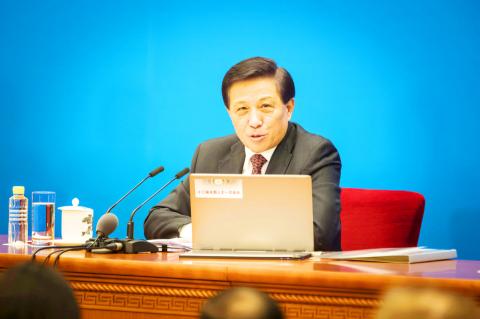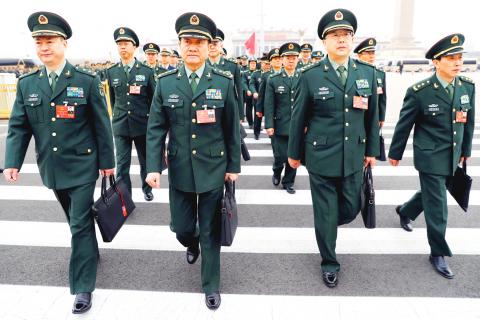China has no desire to overturn the existing international order and its increasingly powerful military does not constitute a threat to others, Chinese Vice Minister of Foreign Affairs and National People’s Congress (NPC) spokesman Zhang Yesui (張業遂) said yesterday.
In a break with recent practice, Zhang refused to provide a figure for the rate of growth in the national defense budget.
However, he sought to strike a reassuring tone in remarks at a news conference on the eve of the congress’ annual session.

Photo: Bloomberg
He said China defended and contributed to the UN-centered global order, but also said some reforms were necessary.
“China’s development is conducive to world peace, stability and prosperity,” he said, pointing to global economic growth, trade and poverty reduction.
“As to the international order, we have no intention of overthrowing everything for starting over again,” Zhang said.

Photo: Reuters
Reforms should focus on “international rules that have fallen behind the times and no longer align with the shared aspirations of all nations,” he said.
China’s secretive military had begun to open up a crack in recent years, and the NPC spokesman has made a tradition of responding to a question on the defense budget by announcing the percentage increase over the past years, at least in rough terms.
Zhang did not address the question of numbers, saying instead that past increases by a “modest margin” had gone to equipment upgrades, training and improving welfare and living conditions for troops.
China’s defense spending as a share of GDP and the budget also remains lower than that of other major nations, he said.
“China proceeds from a defense policy that is defensive in nature. China’s development will not pose a threat to other countries,” Zhang said.
The Chinese Ministry of Finance last year said the defense budget would top 1 trillion yuan (US$145 billion) after the exact figure was initially kept out of documents released at the start of the annual legislative sessions.
However, China’s publicly announced defense spending has never been accurate since it omits a significant amount of “off-book” expenditures on defense equipment projects, said Peter Jennings, executive director of the Australian Strategic Policy Institute in Canberra.
“What’s alarming is not the non-reporting of largely fictitious defense spending figures so much as the Chinese leadership is shedding even the pretense of being open about its military plans,’’ Jennings said in an e-mail.
Combined with Chinese President Xi Jinping’s (習近平) plans to eliminate term limits on his rule and his consolidation of control over the military, the lack of public information about defense spending and military planning “pushes China toward a more authoritarian and militarized leadership,” Jennings said.
“These trends should be deeply concerning to the Asia-Pacific region and beyond,” he said.

SECURITY: As China is ‘reshaping’ Hong Kong’s population, Taiwan must raise the eligibility threshold for applications from Hong Kongers, Chiu Chui-cheng said When Hong Kong and Macau citizens apply for residency in Taiwan, it would be under a new category that includes a “national security observation period,” Mainland Affairs Council (MAC) Minister Chiu Chui-cheng (邱垂正) said yesterday. President William Lai (賴清德) on March 13 announced 17 strategies to counter China’s aggression toward Taiwan, including incorporating national security considerations into the review process for residency applications from Hong Kong and Macau citizens. The situation in Hong Kong is constantly changing, Chiu said to media yesterday on the sidelines of the Taipei Technology Run hosted by the Taipei Neihu Technology Park Development Association. With

CARROT AND STICK: While unrelenting in its military threats, China attracted nearly 40,000 Taiwanese to over 400 business events last year Nearly 40,000 Taiwanese last year joined industry events in China, such as conferences and trade fairs, supported by the Chinese government, a study showed yesterday, as Beijing ramps up a charm offensive toward Taipei alongside military pressure. China has long taken a carrot-and-stick approach to Taiwan, threatening it with the prospect of military action while reaching out to those it believes are amenable to Beijing’s point of view. Taiwanese security officials are wary of what they see as Beijing’s influence campaigns to sway public opinion after Taipei and Beijing gradually resumed travel links halted by the COVID-19 pandemic, but the scale of

A US Marine Corps regiment equipped with Naval Strike Missiles (NSM) is set to participate in the upcoming Balikatan 25 exercise in the Luzon Strait, marking the system’s first-ever deployment in the Philippines. US and Philippine officials have separately confirmed that the Navy Marine Expeditionary Ship Interdiction System (NMESIS) — the mobile launch platform for the Naval Strike Missile — would take part in the joint exercise. The missiles are being deployed to “a strategic first island chain chokepoint” in the waters between Taiwan proper and the Philippines, US-based Naval News reported. “The Luzon Strait and Bashi Channel represent a critical access

Pope Francis is be laid to rest on Saturday after lying in state for three days in St Peter’s Basilica, where the faithful are expected to flock to pay their respects to history’s first Latin American pontiff. The cardinals met yesterday in the Vatican’s synod hall to chart the next steps before a conclave begins to choose Francis’ successor, as condolences poured in from around the world. According to current norms, the conclave must begin between May 5 and 10. The cardinals set the funeral for Saturday at 10am in St Peter’s Square, to be celebrated by the dean of the College